After decades of science fiction novels, films, and serialized Twilight Zone derivatives, the rapid onset and development of artificial intelligence has finally come to fruition.
No matter where you go on the internet these days, you will quickly become bombarded by the reality that not only has AI already become a valuable tool for mankind, but its long-term implications and rapid trajectory leave a multitude of concerns on our horizon.

There are technophiles who champion the advancement of artificial intelligence and its alarming ascension towards singularity, while understandably, many others are more than terrified of its risks.
Regardless of where you stand on the topic, one thing is clear for now: AI tools like ChatGPT are available, being heavily used, and will continue to evolve over future updates.
With these points in mind, it is clear that AI is going to have a significant impact on digital marketing (as well as almost every other industry and profession) in the coming months and years.
Here, I will highlight six predictions for ChatGPT, AI, and the future of PPC marketing:
- Increased competition (and higher costs)
- Improved targeting
- Enhanced ad copy
- More efficient ad campaigns
- Greater reliance on machine learning
- Continued innovation
Let’s get started.
1. Increased competition (and higher costs)
Due to AI tools like ChatGPT’s potential to provide advertisers with more powerful tools for targeting and optimizing their PPC campaigns, increased competition for an already saturated ad space may ensue. If advertisers who are leveraging ChatGPT are able to achieve better results and generate more revenue from their campaigns, then it may lead to higher prices for keywords and make it even more difficult for smaller advertisers to compete.
ChatGPT could be particularly beneficial for larger advertisers who have the resources to invest in machine learning algorithms and other advanced technologies. These advertisers may be able to use ChatGPT to gain a competitive advantage and outbid smaller advertisers for ad space. It is a possibility that increased usage of ChatGPT and other AI tools may improve blind spots that the account managers, agencies, and practitioners who are working for larger businesses otherwise would have missed.
It’s important to note that this prediction is not certain, and there are many factors that could influence the competitiveness of the paid media space for years to come. One thing is fairly certain though, and that is search advertising is not getting any cheaper.
Another issue that has been discussed is the reduction in the usage of Google Search because of ChatGPT.
The AI tool is very capable of answering nearly any question that you would search for on Google in addition to curating lists of recommendations for you for travel or entertainment. (The only caveat is that ChatGPT, in particular, is unable to source information beyond 2021 at this time.)
Google recently announced its own AI search experience, Google Search Generative Experience (SGE), which integrates AI into the SERP. This experience pushes organic search results even further down the page and may impact non-paid search traffic and click-through rates, leading to increased competition to show in Google Ads above SGE results.
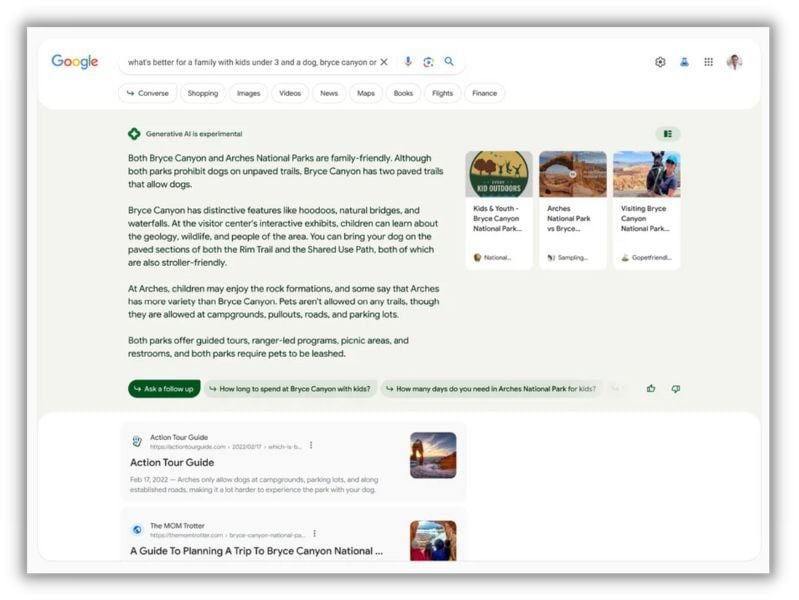
The bottom line: Even with ChatGPT and Google SGE, I don’t believe that AI tools are going to be the end of search ads or search as a whole, but I do believe it is part of an evolution or transition to a more efficient model.
Are you missing out on opportunities to optimize your Google Ads account? Find out instantly the Free Google Ads Performance Grader.
2. Improved targeting
ChatGPT (and AI in general) has the ability to analyze large amounts of data and generate insights about audience behavior. We already see this to a degree with smart bidding strategies within Google Ads.
Given that the target keywords and ad copy you have created are aligned, Google’s automated bidding can “learn” over time how to produce more of the desired results that you want, such as conversions, clicks, and more.
AI tools, however, have the capability of analyzing data through text, CSV, or JSON files. This means that it can analyze user behavior on websites and other digital channels to identify patterns and trends. It can track which pages users visit, how long they stay on each page, and which actions they take (such as clicking on links or filling out forms).
ChatGPT can also be a valuable tool for keyword research–curating lists and structures for ad groups for you to target. (Although we don’t recommend using it as your primary keyword research tool.)
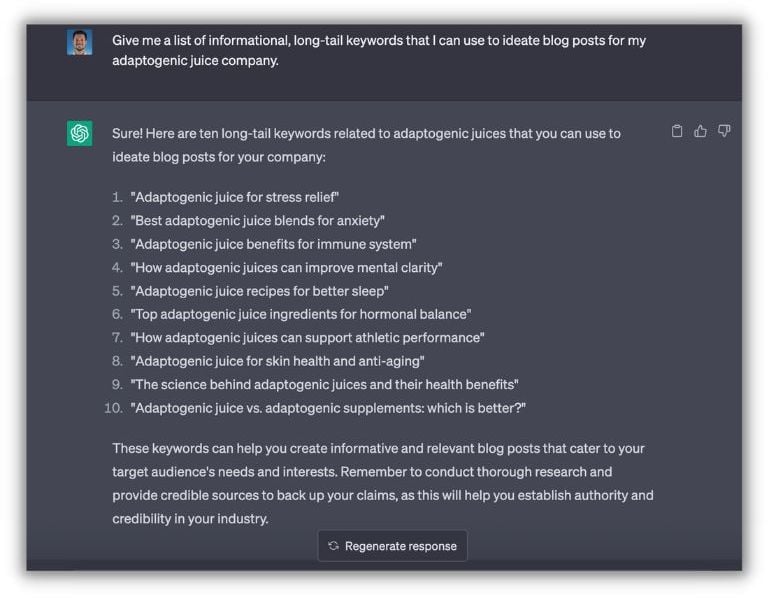
With this information, ChatGPT could help advertisers develop more effective targeting strategies for their PPC campaigns. For example, it could help them identify the keywords and phrases that are most likely to be searched by their target audience and then use this information to create ads that are more relevant and engaging.
ChatGPT could also help advertisers segment their audience based on factors like demographics, interests, and behavior.
The bottom line: Although AI isn’t currently taking away jobs from PPC professionals, those who decide to leverage the tool will have a competitive advantage over those who choose not to. As one Google exec said at Google Marketing Live 2023, “You’re not competing against AI. You’re competing against other marketers using AI.”
3. Enhanced ad copy
One of ChatGPT’s obvious strengths is its natural language processing capabilities. By giving the AI enough information about the type of ad copy you are looking to generate, ChatGPT is able to produce persuasive (and sometimes surprisingly creative) suggestions. Whether you wish to use ChatGPT as a starting point to brainstorm headlines or to have it generate the ad copy word-for-word for you, it is an extremely powerful tool for PPC.
ChatGPT has been trained on vast amounts of text data and has the ability to generate natural-sounding language. This means that it could help advertisers create more engaging ad copy that resonates with their target audience.
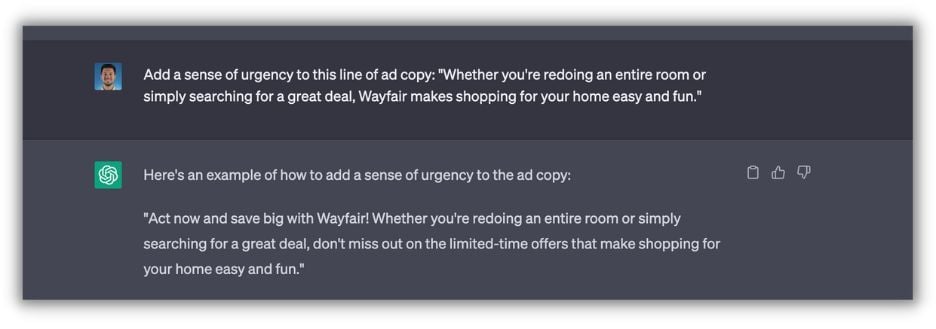
Even the best marketers have periods of writer’s block or feel the copy that they have produced could be better or hit on the desired pain points in a more concise manner. ChatGPT is extremely helpful in these situations as it can also provide additional feedback on your target audience in addition to taking the copy you wrote and editing it to be more readable.
Google is also using AI to help advertisers create and enhance ad copy. They announced asset creation within Performance Max which will use generative AI to generate ad headlines that more closely match search queries.
The bottom line: AI tools like ChatGPT can provide a helpful jumping-off point, but these tools still lack the ability to humanize or infuse personality into ad copy. However, ad copy is such a critical aspect of marketing that any small improvement could have massive returns in regards to CTR and overall ad performance. (Use these ChatGPT prompts as a jumping-off point to help enhance your ad copy.)
💰 Ready to hit the jackpot of ad copywriting tips? Free guide: 10 Tricks to Get the Click: How to Write Exceptional PPC Ad Copy (with Examples!)
4. More efficient ad campaigns
With improvements to both targeting and ad copy, ChatGPT and other AI tools have the ability to help advertisers create more efficient ad campaigns overall.
By making certain aspects of the process such as keyword research and ad copy less tasking, AI could help advertisers save a considerable amount of time and reduce costs. ChatGPT, for example, has the ability to analyze user behavior and preferences to understand what types of ads are most likely to be relevant and engaging to each individual user. It could analyze data such as search history, browsing behavior, and social media activity to determine what topics and products users are interested in.
With this information, ChatGPT could make more accurate and personalized ad recommendations for each user. Instead of showing generic ads that may not be relevant to the user’s interests, ChatGPT could suggest ads that are more likely to resonate with each user based on their individual preferences. The result of these more personalized ad recommendations could be a better user experience and higher engagement and conversion rates.
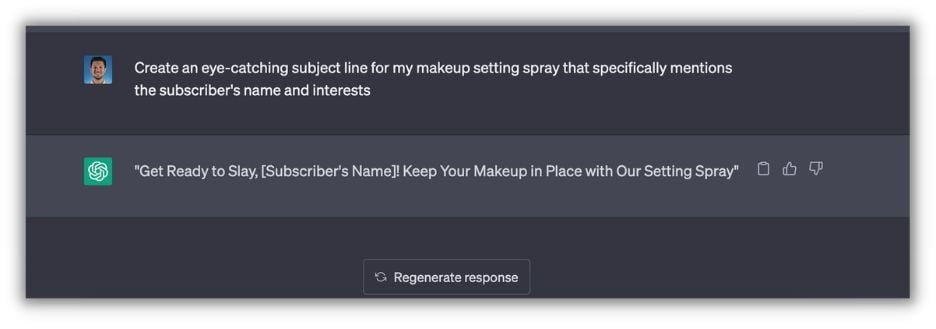
Additionally, ChatGPT could help advertisers optimize their ad campaigns based on user feedback.
The bottom line: By analyzing user behavior and preferences, AI could provide insights into what types of ads are most effective and which ones are not performing as well. Advertisers could use this information to adjust their targeting and ad creative to improve the overall effectiveness of their campaigns.
5. Greater reliance on machine learning
I’ve touched on the increasing use of machine learning in the paid media space over the last six years in numerous posts. My position on the topic has remained consistent, although slightly altered, over this span of time. To summarize my views: machine learning has greatly improved the ease of setting up and running campaigns, and with particular goals set within the platform, great improvements to performance can be experienced.
However, the increased usage and forfeiture of control from advertisers to the “algorithm” that is run by the entity designed to take your advertising budget isn’t always a good thing. These platforms can add unnecessary bloat to campaigns and limit your ability to make very refined adjustments that you used to be able to make. They are essentially trying to make PPC a one-size-fits-all robot that will run your ads for you.
As AI tools continue to evolve and improve, advertisers may become more reliant on machine learning algorithms to manage their PPC campaigns. As stated above, this could lead to greater efficiency and better results. However, it may also lead to a lack of insight into how money is being spent and a general lack of genuine nuance that a human can apply to a marketing campaign.
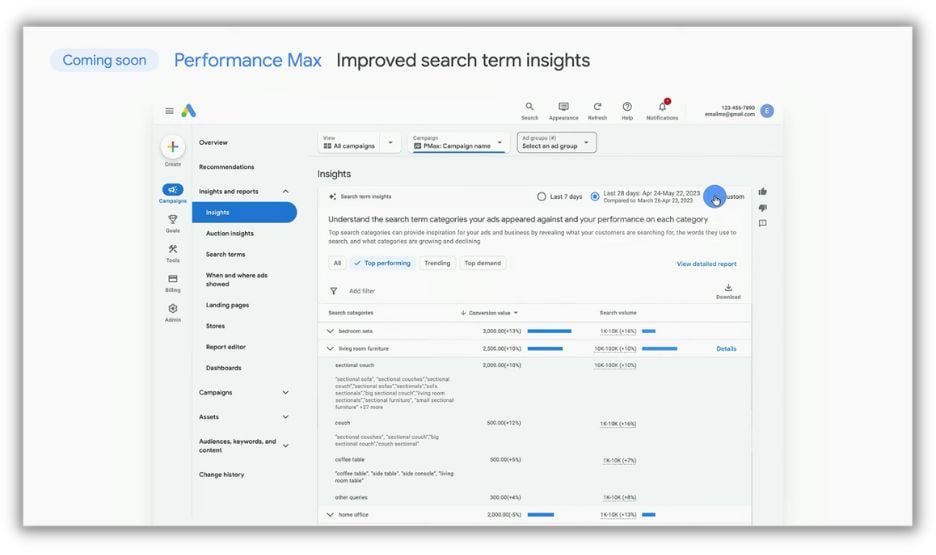
Google is trying to provide greater transparency into how Performance Max campaigns are being optimized through its improved search term insights report.
The bottom line: This prediction is my most concerning on the list for a couple of different reasons. The first is that an AI can absolutely run PPC campaigns for you. Whether at this stage or in future iterations, the technology is clearly capable of building and running PPC campaigns. This has the potential to eliminate jobs.
But it shouldn’t. And here’s why: Many search advertising professionals have found that the “best practices” AI implements aren’t always the best practice for a specific advertiser. The AI used to set up, create, and run PPC campaigns will be applying whatever best practices its creator designs it to have, many of which may be in the best interest of the company and not the advertiser from a cost-efficiency standpoint. This is why it’s going to be so important to incorporate that human touch and oversight into AI-enabled PPC campaigns.
🚨 Want to learn how to use AI the right way for your marketing? Free download >> Emergency Guide to AI in Marketing
6. Continued innovation
As ChatGPT and AI continue to evolve and improve, we can expect to see ongoing innovation in the PPC industry. This could lead to new ad formats, targeting techniques, and measurement tools that help advertisers get even better results from their campaigns (which we’ve already seen a glimpse of from Google Marketing Live 2023).
The rate at which we will see these changes is still up in the air. As mentioned, AI is progressing at a somewhat alarming speed. With any new technology, there is typically an adoption period that spans months and years that allows industries to catch up.
For example, it took years for businesses to master the process of selling online to the point where it is the primary place of commerce. The internet itself took decades to evolve. This gave everyone enough time to adjust to the changes and slowly evolve their businesses over time. With AI and ChatGPT, we could experience change at a rapid and disruptive rate that hasn’t necessarily been experienced since the industrial revolution.
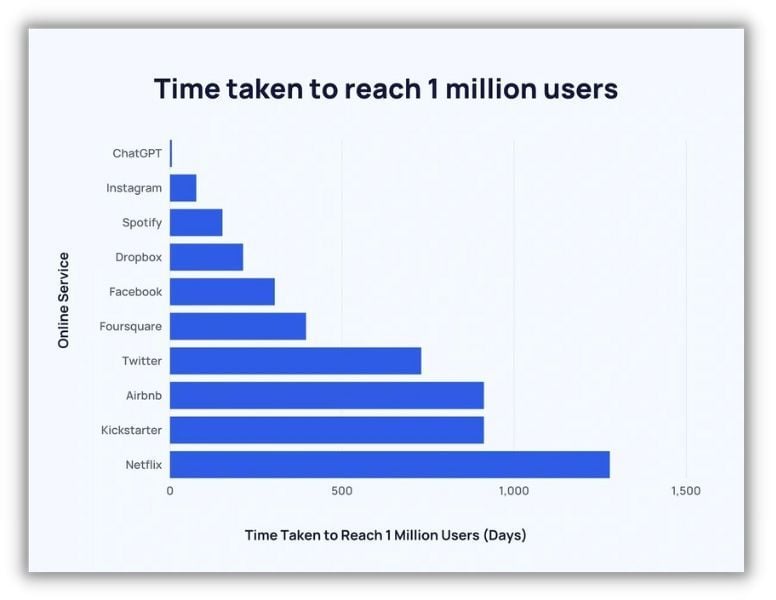
Here are some of the top places I expect we’ll see continued innovation.
Ad targeting and performance
ChatGPT is just one example of this innovation, but there are likely to be many more developments in the years to come. One area where we can expect to see continued innovation in PPC is the use of artificial intelligence and machine learning to improve ad targeting and performance. As AI and machine learning technologies continue to improve, advertisers will have access to more advanced tools and algorithms for analyzing user behavior and preferences, identifying trends, and optimizing ad campaigns.
New ad formats and channels
Another area where we can expect to see innovation is in the use of new ad formats and channels. For example, as voice assistants and smart speakers become more prevalent, advertisers may start exploring ways to deliver ads through these devices. Similarly, we may see new types of ads that are more interactive, personalized, or immersive, such as augmented reality (AR) ads or virtual reality (VR) ads.
Measurement and attribution of ad performance
Finally, we can expect to see continued innovation in the measurement and attribution of ad performance. As more and more users interact with ads across multiple devices and channels, advertisers will need better ways to track and analyze these interactions to understand the impact of their ad campaigns.
The bottom line: The result of this continued innovation in the PPC advertising industry could be a more effective and efficient advertising ecosystem, with advertisers able to reach their target audience more accurately and users experiencing more relevant and engaging ads. It also means that advertisers need to be tuned in to the updates happening in the PPC landscape and be ready to make changes and experiment to continue seeing good results.
The bottom line: AI’s impact on PPC marketing
Overall, the future of PPC advertising looks bright, with plenty of opportunities for advertisers to achieve their marketing goals, especially when using AI capabilities to enhance campaigns rather than relying on it fully.
As AI continues to evolve, it will be more important than ever to stay on top of the curve and keep an eye on the latest updates and innovations.
Source:-https://www.wordstream.com/blog/ws/2023/05/30/ai-impact-on-ppc